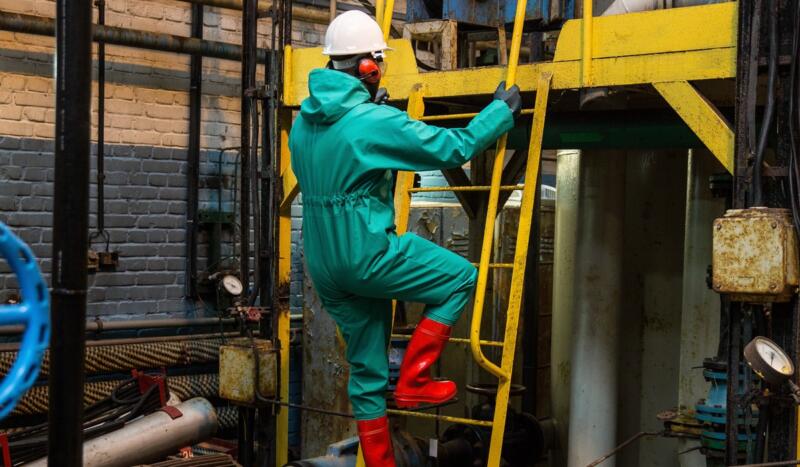Environmental health is a field of public health that focuses on the interactions between humans and their environment and how they affect health and well-being. Environmental health professionals work to prevent, identify, and mitigate environmental hazards that threaten human health and ecological systems.
If you want to pursue a career in environmental health, you may wonder what kind of education and training you need. This article will explore the curriculum for a bachelor’s degree in environmental health and how it can prepare you for various opportunities in this dynamic and rewarding field.
Table of Contents
What is a Bachelor’s Degree in Environmental Health?
A bachelor’s degree in environmental health is a four-year undergraduate program that provides students with the knowledge and skills to protect public health from environmental threats. A bachelor’s degree in environmental health typically includes courses in environmental science, biology, chemistry, physics, math, microbiology, epidemiology, risk assessment, environmental policy, and public health principles. Many programs also emphasize practical experience through internships and fieldwork.
A bachelor’s degree in environmental health can lead to various career paths, such as:
- Environmental health specialist: An environmental health specialist inspects, monitors, and enforces environmental regulations and standards compliance. They may work for local, state, or federal agencies or private consulting firms. They may specialize in areas such as air quality, water quality, food safety, waste management, or occupational health.
- Industrial hygienist: An industrial hygienist is an expert in identifying and controlling workplace hazards that may affect the health and safety of workers. They may work for employers, unions, government agencies, or consulting firms. They may conduct surveys, assessments, audits, sampling, testing, training, or research on topics such as chemical exposure, noise, radiation, ergonomics, or ventilation.
- Public health worker: A public health worker promotes and protects the health of communities and populations. They may work for non-governmental organizations (NGOs), international agencies, or government agencies. They may perform tasks such as education, outreach, advocacy, policy analysis, program planning, evaluation, or research on issues such as infectious diseases, chronic diseases, environmental justice, climate change, or disaster preparedness.
Other career paths in environmental health include Environmental consultant, Safety Inspector, Environmental educator, and Environmental lawyer.
What are the Benefits of a Bachelor’s Degree in EH?
A Bachelor’s Degree in Environmental Health will equip you with the knowledge and skills to address complex environmental health challenges in various settings. You will learn how to:
- Conduct environmental risk assessments and investigations
- Apply environmental science and public health principles to solve problems
- Communicate effectively with diverse stakeholders and audiences
- Develop and implement environmental policies and regulations
- Collaborate with other professionals in multidisciplinary teams
- Use analytical tools and technologies to collect and interpret data
What are the Requirements for a Bachelor’s Degree in Environmental Health?
To enroll in a Bachelor’s Degree in Environmental Health program, you must meet the institution’s admission requirements. Typically, these include:
- A high school diploma or equivalent
- A minimum GPA of 2.5 or higher
- A minimum SAT or ACT score (varies by institution)
- A completed application form and fee
- A personal statement or essay
- Letters of recommendation (optional)
Some programs may also require you to complete prerequisite courses in biology, chemistry, physics, math, and microbiology before starting the major courses.
What are the Courses for a Bachelor’s Degree in EH?
The curriculum for a Bachelor’s Degree in Environmental Health program varies by institution but generally consists of core courses, major electives, general education courses, and experiential learning components. The core courses cover the fundamental concepts and methods of environmental health science, such as:
- Public health administration
- Environmental risk assessment
- Biostatistics
- Epidemiology
- Environmental Toxicology
- Industrial hygiene
- Food safety
- Water quality
- Air quality
- Solid and hazardous waste management
- Environmental law and policy
The major electives allow you to choose from various topics that interest you or align with your career goals. Some examples of major electives are:
- Environmental emergencies and disasters
- Global environmental health
- Advanced GIS (geographic information systems)
- Occupational health and safety
- Climate change and health
- Environmental justice and ethics
The general education courses provide a well-rounded education that complements your major. They include subjects such as:
- English composition
- Humanities
- Social sciences
- Mathematics
- Natural sciences
The experiential learning components provide you with hands-on experience in applying your knowledge and skills to real-world situations. They include:
If you find article useful, don't miss out on the valuable insights and information available in our other related posts:
- Internships: You will work under the supervision of an environmental health professional in a relevant organization for a specified period.
- Fieldwork: You will conduct field-based research or projects related to environmental health issues.
- Capstone: You will complete a final project demonstrating mastery of the environmental health discipline.
How Long Does it Take to Complete a Bachelor’s Degree in Environmental Health?
A Bachelor’s Degree in Environmental Health typically takes four years to complete if you attend full-time. However, some factors may affect the duration of your program, such as:
- Your prior academic credits: If you have completed some college courses or have an associate degree, you may be able to transfer some credits and reduce your time to graduation.
- Your course load: If you take more or fewer courses per semester than the recommended number, you may finish your program sooner or later than expected.
- Your program format: Some programs may offer online or hybrid options that allow you to study at your own pace and convenience.
How Much Does it Cost to Earn a Bachelor’s Degree in Environmental Health?
The cost of earning a Bachelor’s Degree in Environmental Health depends on several factors, such as:
- The institution you choose: Different institutions have different tuition and fees, which may vary by state or country.
- The program format: Online or hybrid programs may have lower costs than on-campus programs but may also have additional fees for technology or materials.
- The financial aid you receive: You may be eligible for scholarships, grants, loans, or work-study opportunities to help you pay for your education.
According to the U.S. Department of Education, the average annual tuition and fees for a Bachelor’s Degree in Environmental Health program in the U.S. was $9,410 for public institutions and $32,410 for private institutions in 2018-2019. However, these are only estimates and may not reflect the actual costs of your program.
How Can You Choose the Right Bachelor’s Degree Program in Environmental Health for You?
Choosing the right bachelor’s degree program in environmental health depends on your goals, interests, preferences, and resources. Here are some factors that you may want to consider when comparing different programs:
- Accreditation: Accreditation is a quality assurance process that evaluates educational programs’ standards and outcomes. Accreditation can help you ensure that the program meets the criteria of professional organizations and employers. You may look for programs accredited by reputable agencies such as the Council on Education for Public Health (CEPH) or the National Environmental Health Science & Protection Accreditation Council (EHAC).
- Curriculum: Curriculum is the set of courses and learning objectives that make up a program. Curriculum can vary widely depending on the focus and scope of the program. You may want to look for programs that offer a balance of theoretical and applied knowledge, a variety of electives that match your interests, and opportunities for hands-on experience through internships or fieldwork.
- Faculty: Faculty are the instructors and mentors who guide your learning process. Faculty can have different backgrounds, expertise, and teaching styles. You may want to look for programs that have faculty who are qualified, experienced, and accessible.
- Cost: Cost is the amount of money that you need to pay for tuition, fees, books, and other expenses related to your education. Cost can vary depending on the institution’s type and location, the program’s length and format, and the availability of financial aid or scholarships. You may want to look for affordable programs, offer financial assistance, and have a good return on investment.
- Resources: These facilities and services support your learning and development. You should look for programs that offer adequate resources, such as laboratories, libraries, equipment, software, career services, and student organizations.
- Outcomes: Outcomes are the results and achievements you can expect from completing your program. You should look for programs with positive outcomes, such as high graduation rates, high employment rates, high satisfaction rates, and a high alumni network.
The Bottom Line
A bachelor’s degree in environmental health can be a rewarding and fulfilling choice for your education and career. You will learn how to protect human health and the environment from various hazards and threats and promote environmental sustainability and justice. If you are passionate about environmental health and want to make a difference, this degree might be the right choice. We hope this article has given you useful information and insights on what a bachelor’s degree in environmental health entails and how to choose the right program.





